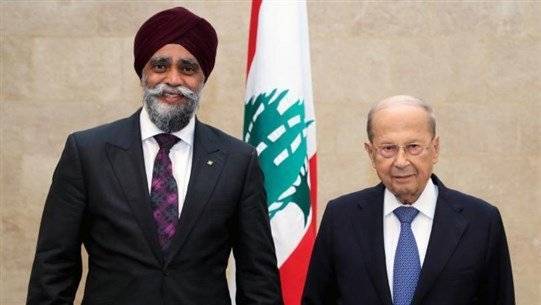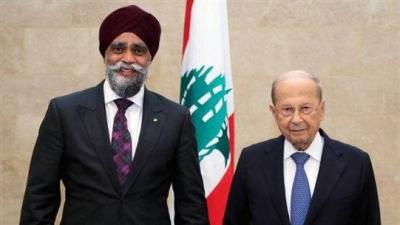President Michel Aoun stated that the attempt by some countries to integrate Syrian refugees in Lebanon into Lebanese society is a crime that Lebanon will not accept at any cost. He emphasized that local, regional, and international laws refuse to displace a people from their land for any reason. During his meeting today with Canada's International Development Minister Harjit Sajjan at the Baabda Palace, President Aoun mentioned that Lebanon is in the process of preparing a legal study to submit to the United Nations concerning the issue of Syrian displacement. He expressed hope for support from friendly nations, especially given current conditions in Syria that facilitate the return of refugees to their country, noting that Lebanon can no longer bear the economic, social, healthcare, and security burdens of approximately 1.5 million Syrian refugees in its territory.
President Aoun insisted to Minister Sajjan that claims made by some countries and international organizations suggesting that returning Syrians would face persecution or imprisonment are untrue. He reported that about 500,000 Syrians have returned from Lebanon to Syria in organized groups over the past years without reporting any harassment upon their return. Syrian officials have stated their desire for the return of citizens who wish to go back.
In light of these facts, President Aoun expressed suspicion about the positions taken by some countries and organizations, stating that if the goal is to settle Syrian refugees in Lebanon, Lebanon categorically rejects this, just as it previously rejected the settlement of Palestinians. He reaffirmed that Lebanon has repeatedly requested international organizations to provide assistance designated for Syrian refugees within Syrian territories rather than in Lebanon, as this would encourage their return, yet Lebanon's requests in this regard have not received adequate response, raising concerns about potential schemes being planned against Lebanon and its citizens.
During the meeting, President Aoun thanked Minister Sajjan for the assistance Canada provided to Lebanon following the Beirut port explosion, wishing for continued Canadian support and strengthened bilateral relations in various fields. He noted that the accumulation of mismanagement over the past thirty years has exploded simultaneously, worsening with the poverty rate reaching 75% of the Lebanese population, necessitating urgent aid from brotherly and friendly countries, primarily Canada, which has longstanding relations with Lebanon and hosts about 400,000 people of Lebanese origin across its provinces.
President Aoun conveyed his regards to Canadian Prime Minister Justin Trudeau and thanked him for his country's solidarity with Lebanon. He also appreciated Minister Sajjan's role during his tenure as Minister of Defence from 2015 to 2021 in supporting Lebanon militarily by training hundreds of Lebanese officers through Canada's IMPACT military program to fight terrorism and the Canadian support team in Lebanon to train and assist in monitoring the borders in mountainous areas.
The President requested Minister Sajjan, as the International Development Minister, to continue providing humanitarian, developmental, military, and relief assistance.
Minister Sajjan thanked President Aoun at the beginning of the meeting for his welcome and reaffirmed Canada's commitment to continue aiding Lebanon, particularly in ensuring food security, noting that his visit will serve as an opportunity to assess needs and prioritize urgent matters. He expressed Canada's support for the anticipated agreement between Lebanon and the International Monetary Fund, which will enhance international support for Lebanon in general, and specifically Canadian aid. Minister Sajjan mentioned that Canada supports the return of Syrian refugees to their homeland, having hosted about 60,000 Syrian refugees, half of whom are from Lebanon. He also reiterated that Canada does not support the integration of refugees into host communities and will continue to assist in resolving the Syrian crisis, emphasizing the strength of Lebanese-Canadian relations and the active role of Lebanese individuals in Canada in contributing to Canadian society.
The meeting was attended on the Canadian side by Ambassador to Lebanon Chantal Chastenay, political advisor Joel Montfils, executive director Sean Boyd, and communications director Tode Lane. On the Lebanese side, attendees included former minister Selim Jreisati, General Director of the Presidency Dr. Antoine Chaqir, Lebanon's Ambassador to Canada Fadi Zeidan, and advisors Rafiq Shalala and Osama Khashab.




